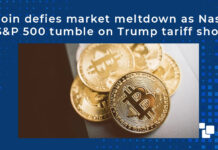The Brazilian ETF will launch on March 1 on the B3 platform. There are already 13 Brazilian ETFs with crypto exposure. BlackRock’s iShares spot Bitcoin exchange-traded fund will be available in Brazil thanks to the launch of a new BTC BDR (Brazilian Depositary Receipts) ETF. Trading will begin on March 1, the world’s largest asset manager announced on Feb. 29.
BlackRock will partner with Brazilian financial market infrastructure provider B3 to offer the new product, BlackRock Brazil president Karina Saade said at the company’s headquarters in São Paulo. Saade stated:
“The launch of the iShares Bitcoin Trust ETF BDR, IBIT39, advances the innovation of ETFs and allows access to bitcoin for investors through a security — the ETF BDR — that can be incorporated […] into their portfolios.”
BDRs of foreign ETFs are securities issued in Brazil and backed by shares of ETFs issued abroad. The Brazilian ETF is thus effectively the same BTC ETF that BlackRock launched in the United States in January. It will mirror the U.S. ETF’s performance and carry an administrative fee of 0.25%, offset by a one-year exemption on the first $5 billion of assets under management (AUM). BDRs are fully taxable.
The Brazilian fund will be available to investors that already have at least 1 million reals ($201,000) invested in the market. BlackRock Brazil is still waiting for approval of retail sales.
There are 13 ETFs with crypto exposure listed on B3, which began listing in 2021. They have a combined value of 2.5 billion reals ($503 million). The Brazilian crypto ETFs have seen 30 million reals ($5 million) in trade volume so far this year.
The BlackRock spot BTC ETF was one of 10 approved by the United States Securities and Exchange Commission on Jan. 10. The fund reached $2 billion in AUM in two weeks and tied with Fidelity’s spot BTC fund in having the largest debut month in the history of ETFs. The BlackRock ETF currently has over $8 billion in AUM.
According to various media reports, BlackRock will consider the launch of a spot Ether ETF in Brazil if it receives SEC approval to launch one in the United States.
Source: cointelegraph.com




